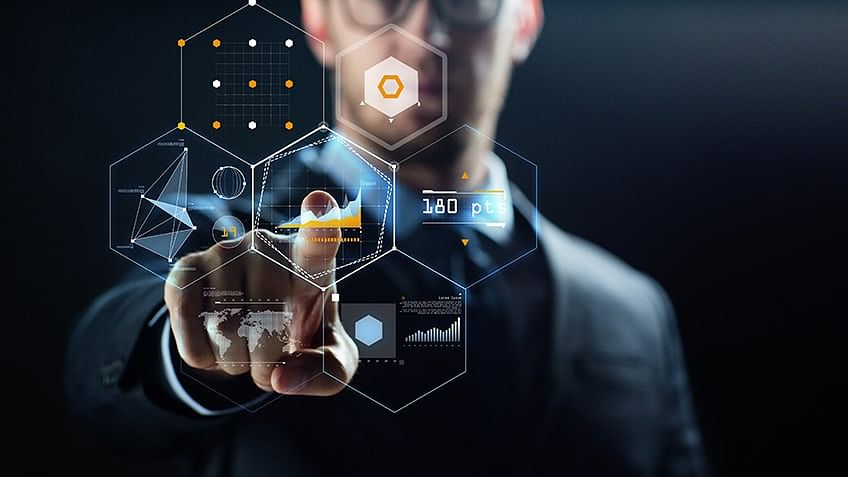Skip to main content
How to Become a Data Scientist in 2024: Complete Guide

revious
Next
Table of Contents
Data Scientist vs Data Analyst
What Does a Data Scientist Do?
Role of a Data Scientist
Data Science Qualifications and Eligibility Required
Skills to Become A Data ScientistView More
Companies worldwide have always gathered and analyzed data about their customers to provide better service and improve their bottom lines. In today’s digital world, we are able to gather tremendous amounts of data, which require non-traditional data processing methods and software.
A data scientist is a professional who specializes in analyzing and interpreting data. They use their data science skills to help organizations make better decisions and improve their operations. Data scientists typically have a strong background in mathematics, statistics, and computer science. They use this knowledge to analyze large data sets and find trends or patterns. Additionally, data scientists may develop new ways to collect and store data.
Become a Data Scientist with Hands-on Training!Data Scientist Master’s ProgramEXPLORE PROGRAM

Data Scientist vs Data Analyst
Aspect
Data Scientist
Data Analyst
Role
Focus on predictive modeling, machine learning, and advanced statistical analysis to create insights and predictive models from large datasets.
Primarily analyze historical data to find trends, develop charts, and create reports to help businesses make more informed decisions.
Skills Advanced statistical analysis
Machine learning
Deep learning (for some positions)
Programming (Python/R)
Big data technologies
Data visualization Statistical analysis
Data visualization (Tableau, PowerBI)
SQL
Programming (Python/R)
Microsoft Excel
Tools Python, R
TensorFlow, PyTorch
Spark, Hadoop
SQL databases
Data visualization tools SQL databases
Excel
Tableau, PowerBI
Basic Python scripts
Google Analytics
Educational Background
Typically require a Master’s or PhD in Statistics, Computer Science, Mathematics, or related fields. Advanced degrees are common.
Bachelor’s in IT, computer science, or statistics. Masters is beneficial but not as commonly required as for Data Scientists.
Salary Expectation
Salaries are higher due to the demand for their advanced analytical skills and the complexity of their work. Salaries vary by region and experience.
Generally lower than Data Scientists but can vary based on experience, industry, and region. Starting salaries are good with growth potential.
What Does a Data Scientist Do?
A Data Scientist extracts, analyzes, and interprets data to uncover valuable insights and inform strategic decisions. They collect and clean data from various sources, perform exploratory data analysis to identify patterns, and create predictive models using ML and statistical techniques.
Data Scientists also play a crucial role in feature engineering, model evaluation, and deploying models into production. Their work spans industries, aiding businesses in optimizing operations, improving products, and driving data-driven strategies for success. They are instrumental in transforming data into actionable knowledge that drives innovation and competitive advantage.
Role of a Data ScientistData Cleaning and Preparation: Scrubbing data to ensure its quality and readiness for analysis. This involves handling missing values, detecting outliers, and ensuring data consistency.
Data Exploration and Analysis: Using statistical methods to explore the relationships between different variables in datasets, identify patterns, and detect anomalies.
Predictive Modeling: Developing models that predict future outcomes based on historical data. This involves selecting the appropriate model, training it with data, and validating its accuracy.
Machine Learning and Advanced Analytics: Applying machine learning algorithms to build models that can automate decision-making processes or enhance predictions with increasing accuracy over time.
Data Visualization and Reporting: Creating visual representations of data findings and analysis results to make them accessible and understandable to non-technical stakeholders.
Cross-functional Collaboration: Working with other departments, such as engineering, product, and business teams, to understand their data needs and deliver insights to drive strategic decisions.
Innovative Solution Development: Identifying opportunities to apply data science techniques to new organizational areas, leading to innovative products, services, or operational improvements.
Big Data Technologies: Utilizing big data technologies and tools to handle, process, and analyze large datasets that traditional data processing applications cannot manage.
Continual Learning: Staying current with the latest technologies, algorithms, and methodologies in data science to continually improve processes and outcomes.
Ethical Oversight: Ensuring the ethical collection, handling, and use of data, including considerations for privacy, consent, and bias mitigation.
Data Science Qualifications and Eligibility Required
To become a data scientist, you will need to have strong analytical and mathematical skills. You should be able to understand and work with complex data sets. Additionally, you should be able to use statistical software packages and be familiar with programming languages such as Python or R. Data scientists also typically have a certification from an accredited program.
Read More: Switching to data science was one of the best decisions Ekta Saraogi took for her career. After a varied career in the IT field, our Data Scientist Master's Program offered her the variety she craved with a more stable environment for her career. Read all about Saraogi’s career from IT nomad to Data Science master in her Simplilearn Data Science Course Review.
Skills to Become A Data Scientist
Becoming a data scientist requires diverse skills that span technical, analytical, and soft skills. The role of a data scientist is to extract insights and knowledge from data, which involves a combination of extracting, processing, analyzing, visualizing, and interpreting data. Here's a detailed look at the key skills necessary to become a data scientist:
1. Data Visualization
The ability to transform data and findings into understandable and visually appealing formats. Tools like Tableau, Power BI, and libraries in Python (e.g., Matplotlib, Seaborn) are crucial.
2. Machine Learning
Understanding and applying machine learning algorithms, including supervised and unsupervised learning, to predict outcomes and uncover patterns in data.
3. Communication
Translating complex data findings into clear, concise, and actionable insights for technical and non-technical stakeholders.
4. Programming
Proficiency in programming languages, especially Python and R, is essential for data manipulation, statistical analysis, and machine learning.
5. Statistics and Probability
A strong foundation in statistics and probability to analyze data sets, understand distributions and apply statistical tests and models.
6. Business Acumen
Understanding business processes, goals, and strategies to align data projects with organizational objectives.
7. Computing
Familiarity with cloud computing services (like AWS, Google Cloud, Azure) and big data technologies (like Hadoop and Spark) for processing large data sets.
8. Mathematics
Knowledge of linear algebra, calculus, and optimization techniques is foundational to algorithms and machine learning models.
9. Curiosity
A natural curiosity to ask questions, explore data for hidden patterns, and a continuous desire to learn and discover new techniques and methodologies.
10. Data Wrangling
The ability to clean, structure, and enrich raw data into a desired format for analysis. This involves handling missing values, outliers, and merging datasets.
11. Deep Learning
Understanding neural networks and deep learning frameworks (like TensorFlow and PyTorch) for tasks requiring image recognition, natural language processing, etc.
12. Python
Python is a must-have for data science due to its extensive libraries (Pandas, NumPy, Scikit-learn) and versatility in handling data tasks.
13. Critical Thinking
The ability to approach problems logically, question assumptions, and evaluate the strength of arguments or methodologies.
14. Data Science Theory
Understanding the principles and theories underlying data science practices, including machine learning models and statistical methods.
15. Database Management
Knowledge of SQL and NoSQL databases for storing, querying, and managing data efficiently.
16. Model Deployment
Skills in deploying models into production environments, ensuring they are scalable, maintainable, and can provide real-time insights.
17. Business Intelligence
Using BI tools and techniques to analyze data, produce reports, and support decision-making processes.
18. Unstructured Data
Handling unstructured data (text, images, audio) using techniques like natural language processing (NLP) and computer vision.
19. Analytical Mindset
The ability to approach data analytically, identify trends and anomalies, and make data-driven decisions.
20. Data Intuition
Developing an intuition for data involves understanding what looks right or wrong and where to dig deeper.
21. Big Data
Managing and analyzing large volumes of data with big data technologies, understanding the complexities and challenges of big data environments.
22. Analytics and Modeling
Applying various analytical and modeling techniques to understand data, make predictions, and test hypotheses.
23. Data Transformation
Transforming data into a more useful and interpretable form using normalization, scaling, and feature engineering techniques.
Insightful Read: Data Science Roadmap
How to Become a Data Scientist?
Data science is the area of study that involves extracting knowledge from all of the data gathered. There is a great demand for professionals who can turn data analysis into a competitive advantage for their organizations. In a career as a data scientist, you’ll create data-driven business solutions and analytics.
Step 1: Earn a Bachelor’s Degree
A great way to get started in Data Science is to get a bachelor’s degree in a relevant field such as data science, statistics, or computer science. It is one of the most common criteria companies look at for hiring data scientists.
Step 2: Learn Relevant Programming Languages
While a Bachelor’s degree might give you a theoretical understanding of the subject, it is essential to brush up on relevant programming languages such as Python, R, SQL, and SAS. These are essential languages when it comes to working with large datasets.
Step 3: Learn Related Skills
In addition to different languages, a Data Scientist should also have knowledge of working with a few tools for Data Visualization, Machine Learning, and Big Data. When working with big datasets, it is crucial to know how to handle large datasets and clean, sort, and analyze them.
Become a Data Scientist with Hands-on Training!Data Scientist Master’s ProgramEXPLORE PROGRAM

Step 4: Earn Certifications
Tool and skill-specific certifications are a great way to show your knowledge and expertise about your skills. Here are a few great certifications to help you pave the path:Tableau Certification Training Course
Power BI Certification Course
These two are the most popular tools used by Data Scientist experts and would be a perfect addition to start your career journey.
Step 5: Internships
Internships are a great way to get your foot in the door to companies hiring data scientists. Seek jobs that include keywords such as data analyst, business intelligence analyst, statistician, or data engineer. Internships are also a great way to learn hands-on what exactly the job with entail.
Step 6: Data Science Entry-Level Jobs
Once your internship period is over, you can either join in the same company (if they are hiring), or you can start looking for entry-level positions for data scientists, data analysts, data engineers. From there you can gain experience and work up the ladder as you expand your knowledge and skills.
Data Science at Work
Did you know that media services provider Netflix uses data science extensively? The company measures user engagement and retention, including:When you pause, rewind or fast-forward
What day of the week and what time of day you watch content
When and why you leave content
Where in the world you’re watching from
Your browsing and scrolling behavior
What device you watch on
Netflix has over 120 million users worldwide! To process all of that information, Netflix uses advanced data science metrics. This allows it to present a better movie and show recommendations to its users and also create better shows for them. The Netflix hit series House of Cards was developed using data science and big data. Netflix collected user data from the show, West Wing, another drama taking place in the White House. The company took into consideration where people stopped when they fast-forwarded and where they stopped watching the show. Analyzing this data allowed Netflix to create what it believed was a perfectly engrossing show.
Now let us explore some of the important data scientist skills that an individual should possess.
Future-Proof Your AI/ML Career: Top Dos and Don'tsFree Webinar | 5 Dec, Tuesday | 7 PM ISTREGISTER NOW

Careers in Data Science
Once you’ve mastered these skills, you’ll have a range of career opportunities available. Prepare for a job interview with our data science interview questions.
Data Scientist
Average salary: $120,931
Data scientists create data-driven business solutions and analytics by driving optimization and improvement of product development. They use predictive modeling to increase and optimize customer experiences, revenue generation, ad targeting, and more. Data scientists also coordinate with different functional teams to implement models and monitor outcomes.
Data Engineer
Average salary: $137,776
Data engineers assemble large, complex data sets. They identify, design, and implement internal process improvements and then build the infrastructure required for optimal data extraction, transformation, and loading. They also build analytics tools that utilize the data pipeline.
Data Architect
Average salary: $112,764
Data architects analyze the structural requirements for new software and applications and develop database solutions. They install and configure information systems and migrate data from legacy systems to new ones.
Data Analyst
Average salary: $65,470
Data analysts acquires data from primary or secondary sources and maintain databases. They interpret that data, analyze results using statistical techniques, and develop data collections systems and other solutions that help management prioritize business and information needs.
Become a Data Scientist with Hands-on Training!Data Scientist Master’s ProgramEXPLORE PROGRAM

Business Analyst
Average salary: $70,170
Business analysts assist a company with planning and monitoring by eliciting and organizing requirements. They validate resource requirements and develop cost-estimate models by creating informative, actionable and repeatable reporting.
Data Administrator
Average salary: $54,364
Data administrators assist in database design and update existing databases. They are responsible for setting up and testing new database and data handling systems, sustaining the security and integrity of databases and creating complex query definitions that allow data to be extracted.
Future of Data Science
The future of data science is promising and expected to be integral to the evolution of technology, business, healthcare, and many other sectors. As data generation grows exponentially, sophisticated data analysis and interpretation demand will only increase.Increased Demand Across Industries: Data science will continue to expand beyond tech and finance into healthcare, agriculture, education, and public services, driving innovation and efficiency across all sectors.
Advancements in AI and ML: Artificial intelligence (AI) and machine learning (ML) will become even more sophisticated, enabling more accurate predictions, automation of complex tasks, and the creation of intelligent systems that can learn and adapt over time.
Ethics, Privacy, and Data Governance: As data becomes more integral, ethical considerations, privacy concerns, and robust data governance frameworks will become increasingly important. Ensuring the ethical use of data, combating bias in AI, and protecting individual privacy will be central to the field's evolution.
Integration of IoT and Big Data: The Internet of Things (IoT) will generate vast amounts of data from connected devices, necessitating advanced data science techniques to analyze and derive value from this data. This integration will drive advancements in real-time data analysis and edge computing.
Automation in Data Science: Automation tools will streamline data processing, model development, and analysis, allowing data scientists to focus on more complex and innovative tasks. AutoML (Automated Machine Learning) will become more prevalent, making data science more accessible.
Augmented Analytics: Augmented analytics will use AI and ML to enhance data analytics, sharing, and business intelligence. This will make advanced analytics accessible to non-experts, democratizing data insights across organizations.
Quantum Computing: Though still in its infancy, quantum computing has the potential to revolutionize data science by processing complex datasets at unprecedented speeds. This could lead to cryptography, drug discovery, and complex system simulation breakthroughs.
Focus on Soft Skills: As technical skills become more common and tools become more sophisticated, soft skills like storytelling, critical thinking, and communication will become crucial for data scientists. The ability to translate complex findings into actionable business insights will be invaluable.
Data Science as a Service (DSaaS): The growth of cloud computing will lead to more organizations outsourcing data science tasks. DSaaS will become more common, providing businesses of all sizes access to advanced data analysis without needing in-house expertise.
Continuous and Interdisciplinary Learning: The field will require continuous learning in new technologies and algorithms and in understanding domain-specific knowledge. Data scientists increasingly need interdisciplinary knowledge to solve complex real-world problems.
Conclusion
Becoming a data scientist in 2024 involves continuous learning, curiosity, and skill development. As we've explored, the path to entering the field of data science involves acquiring a blend of technical skills like programming, machine learning, and data visualization alongside soft skills like communication and critical thinking. The future of data science promises exciting opportunities and challenges, making it a rewarding career choice for those willing to navigate its complexities.
For those ready to embark on this journey, the Data Science Masters course offers a detailed curriculum to equip you with the necessary knowledge and hands-on experience to thrive in the field. Whether you're starting from scratch or looking to deepen your expertise, this program covers everything from the fundamentals of data analysis to advanced concepts in machine learning and big data technologies.
Comments
Post a Comment